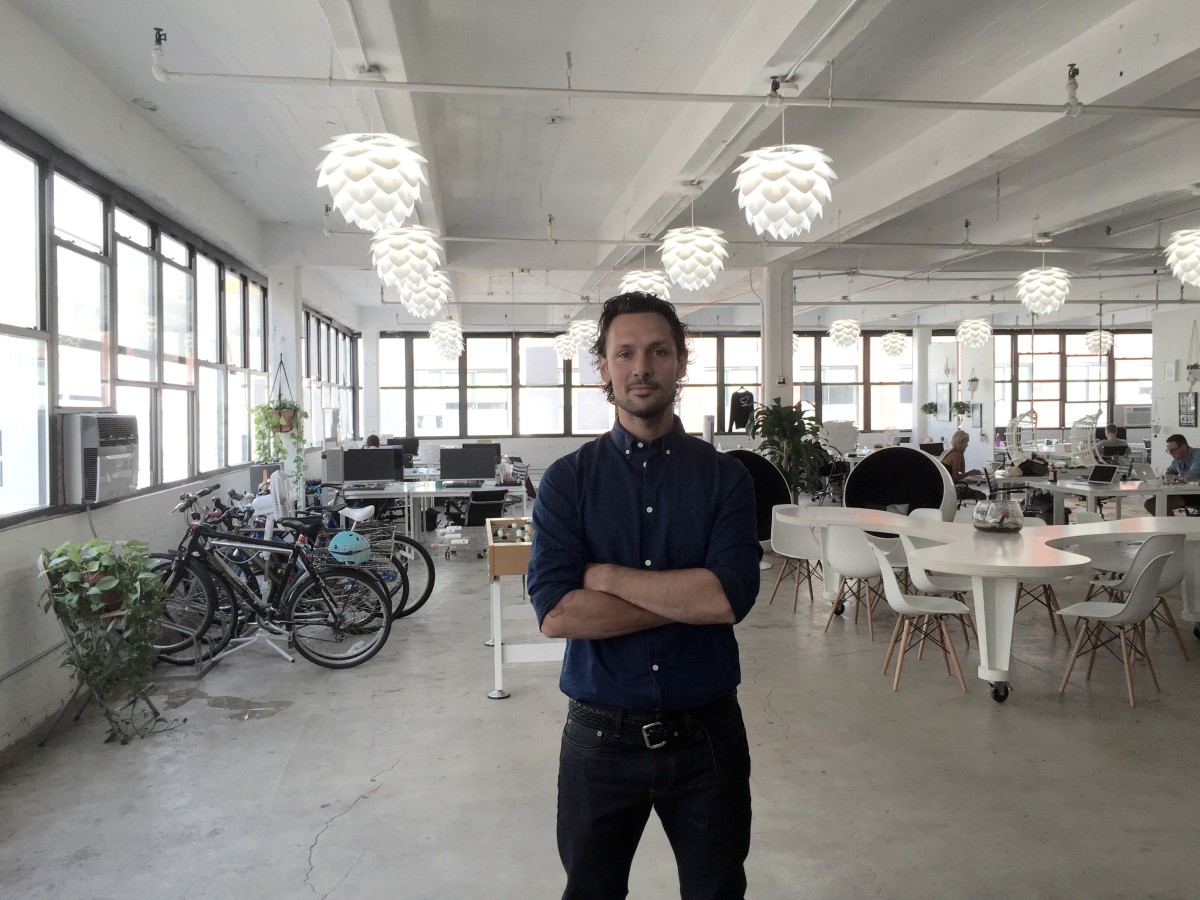There’s something serious going on, on the second floor of an old factory by the waterfront in Williamsburg.
The space was quiet one recent August morning. Dozens of desks bask in the sunlight that comes pouring through the windows. The huge room is sparsely furnished: several plants, a kitchen table, a beehive of drawers, a row of bicycles, an amorphous table with pod-chairs around it.
It’s from this base that Mik Strøyberg readies and launches Nordic companies out to conquer the U.S. market. Strøyberg, who’d poured a glass of iced coffee on tap and taken a seat at the kitchen table, explained his vision.
“We do a company assessment, we find out what are their expectations and dreams, are they product-ready, what’s their funding, why do they want to go to New York,” Strøyberg explained. “The founder comes over for about five days and we make a battle plan. We hire and we manage employees.” His company, Lemonsqueeze, takes a fee or equity in the company, depending on the client.

Among the highest barriers to entry in a foreign market is navigating cultural differences. This is where Strøyberg has found a natural gift. After only a few months in New York, he found Scandinavian friends asking him for restaurant recommendations with frequency. Happily, he made an Excel spreadsheet with his picks and sent that back when people asked.
“That’s the culture thing and where trust comes in,” he said. “I know when they say it has to be chic, it has to be our chic, I know what they mean.”
The tart name of his company itself is a reference to the cultural differences. In Scandinavia, there is a phrase “to squeeze a lemon,” and it means likely getting more than what you deserve. In the United States, we have a phrase about turning lemons into lemonade (presumably by squeezing them).
“If a European company squeezes its employees to make more money, they’re squeezing the lemon,” Strøyberg explained. “In the U. S. that’s how you have to do it. It’s a positive. The competition is so hard over here you can’t sit back and watch, so we’re learning them how to squeeze the lemon. That’s also why we’re hiring all Americans. We’re trying to make them comfortable but we’re also trying to make sure they’re hungry, they’re sharks.”
###
Strøyberg looks like an outlaw and acts like an ombudsman.
He’s trim but muscular and his hair is slicked back and longish, somewhere between rock ‘n’ roll and tennis at the club. A Dane, he grew up in suburban Copenhagen, though he says that anything 30 minutes outside the city quickly becomes countryside there. Though Denmark, Sweden and Norway are separate countries with different languages, they share a common culture, Strøyberg said, and most everyone can understand each of the languages, which might be closer to dialects. Kids grow up with shows and news from each of the countries on television, each in their own language. He went to the Copenhagen Business School at Frederiksberg, where he studied philosophy and marketing (he’s a Platonist). He spent nine years at a media company, working on growing revenue, before he had the chance to come to New York, which had been his dream.
https://twitter.com/MikStroyberg/status/635950731674132480
Strøyberg came to the U.S. four years ago, doing for the company he worked for essentially what he’s doing now, for other companies. He scouted and located an office, helped hire employees, set up an American LLC and all the little things that come with being in a new country.
It took 18 months, and he loved it.
He did it again as a consultant for a different company and it took him 13 months. And again for a different company and it took just a year. Now, with Lemonsqueeze, he’s raised it up a level and has the process down to eight weeks. He’s taken on 15 companies now in New York, and aims for more.
“You can be yourself in New York. It’s difficult to be 100 percent yourself in Scandinavia because it’s so small and you don’t want to step out of the norm,” Strøyberg said. “In New York, if you think you’re doing something weird, wait one second and you’ll find someone doing someone doing something more weird. All my friends over here, they’re all passionate and ambitious and being themselves, resting in themselves. If I ever leave, that’s one of the things I’ll miss the most.”
Lemonsqueeze is working. One of the companies there, Falcon Social, recently received $16 million in funding, and might be growing so big as to leave the Nordic incubator. Others are just starting out. Strøyberg is eyeing adjacent floors and properties with the idea of expanding the space and scaling.
“A workplace is a place where you can get a community and get help and get inspiration,” he said. “Everyone’s trying to help each other cause it’s like one big deal solution. We’re enforcing this.”







